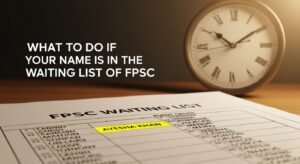Starting a government job in Pakistan marks a significant career milestone, but the probation period that follows is an equally important stage. It is a critical testing ground that determines your long-term future in public service. This guide explains every stage of probation in detail, offering practical insights and strategies to help you succeed. Whether you are newly appointed as a civil servant or preparing for a public sector role, understanding this process thoroughly will help you navigate probation effectively.
Understanding the Probation Period in Government Jobs
The probation period is a mandatory trial phase for all new government appointees. It usually lasts between one and three years, depending on the pay scale and department. Federal employees generally serve two years, while probation in provincial services may last between one and two years. During this time you are not considered a permanent employee, even though you may hold an official appointment letter. Your continuation depends entirely on satisfactory performance assessments conducted by your supervisors.
The purpose of probation is wide-ranging. It validates whether you possess the technical competence, judgment, and work ethic required for permanent service. It also assesses your adherence to bureaucratic discipline, ethical standards, and conduct rules. Adaptability is another important aspect, as probation measures how well you absorb departmental procedures, handle public dealings, and function within hierarchical structures. Finally, probation ensures compliance with the Government Servants (Conduct) Rules and other regulations specific to your department.
The legal foundations of probation lie in Article 240 of the Constitution of Pakistan, Section 9 of the Civil Servants Act of 1973, and various provincial civil service rules such as the Punjab Civil Servants Rules of 2021. These frameworks empower departments to terminate probationers without lengthy proceedings if standards are not met.
Step-by-Step Probation Process
Appointment Letter and Joining
The probation journey begins with the receipt of your appointment letter. This document, issued by the administrative department, specifies your designation, probation duration, initial posting location, and joining instructions. It is important to verify that all personal details such as your name, CNIC, and parentage match your official documents. You must carefully read probation-related conditions, especially if your role requires passing departmental exams, and also check for any clauses such as probation being subject to character verification.
Once the appointment is accepted, formal joining procedures follow. You will be required to submit attested copies of your documents, including academic certificates, CNIC, domicile, and medical fitness certificate. Biometric registration is completed for attendance systems, and you take an oath of allegiance before a gazetted officer. Your service book is then initiated, which will remain a record of your career for life, documenting promotions, postings, and penalties. In most cases you will be assigned a probation mentor, typically a deputy secretary or senior officer, and you will receive the basic office setup required to begin your duties.
Orientation and Training
The next stage is orientation and training. Federal employees often attend courses at the Pakistan Administrative Staff College, while provincial staff train at provincial institutes. The curriculum covers financial management, office procedures, and even special subjects such as CPEC project protocols. On-the-job training follows, where you are rotated through several sections such as accounts, records, and public dealing. This practical work includes drafting notes, managing complaints, or processing pension cases. Ethical training is also part of probation, including workshops on anti-corruption laws and grievance redressal systems.
Work Assignments and Monitoring
Once orientation ends, you begin regular duties, which are monitored closely. Routine tasks like file processing and diary management are checked daily by supervisors, while project-related assignments are reviewed biweekly. Public dealing is monitored through visitor feedback, and special assignments such as election duty or disaster management are evaluated after completion. Supervisors compile monthly performance reports, while Annual Confidential Reports document behavioral aspects such as how well you respond to criticism or resist undue influence. Surprise inspections by audit teams may also occur to test compliance with office rules.
Documentation and Compliance
During probation you are expected to maintain meticulous records. Many officers keep a personal logbook documenting the files they processed, complaints resolved, and trainings completed. You must also master the file movement system within the bureaucracy, where cases move from Section Officer to Deputy Secretary to Secretary. Leave is strictly regulated: earned leave is limited, medical leave requires a proper certificate, and no leave is generally allowed without written approval during the first six months.
Mid-Probation Review
A mid-probation review is conducted after six months for those on one-year probation, and after twelve months for those on a two-year term. This review may include a written test, an interview with a panel that usually includes an outside representative, and a review of your work samples.
Completion or Extension
At the end of probation, either confirmation or extension takes place. If your supervisors recommend confirmation, the case is forwarded to the Departmental Promotion Committee, which checks your attendance, training completion, and conduct record. If all is satisfactory, your confirmation is issued either by gazette notification at the federal level or by memo at the provincial level. If performance is considered weak but improvable, probation may be extended by six to twelve months. If leave was taken without approval, probation is extended accordingly. Termination may occur for consistent poor ratings, misconduct such as accepting bribes, or failure to pass mandatory departmental exams.
Performance Benchmarks During Probation
Performance benchmarks are an important part of probation. File processing is expected to meet departmental standards, with excellent officers completing over fifteen files a day with no errors, while the minimum acceptable standard is usually eight files with fewer than ten percent errors. Public dealing is measured by complaint resolution rates, where ninety percent resolution is considered excellent and sixty-five percent is the minimum. Report writing is judged by how many revisions are needed, with fewer than two being excellent and fewer than five acceptable. Punctuality, integrity, and teamwork are also part of the evaluation, with biometric attendance used to confirm regularity and colleagues’ feedback contributing to teamwork scores.
Transition After Confirmation
Once you successfully complete probation, you transition into confirmed service. At this point termination requires a formal inquiry under the Efficiency and Discipline Rules. Confirmation activates benefits such as pension fund enrollment, housing advance eligibility, and in some cases official transport. Career progression also begins here, as you become eligible to sit for departmental promotion exams. The first steps after confirmation include updating your service book with the confirmation order, enrolling in advanced training programs, and joining relevant service associations.
Survival Strategies for Probation
Survival strategies during probation revolve around three themes: documentation, relationships, and learning. Officers are advised to maintain strict documentation, often keeping daily diaries of work completed and using receipt books for public transactions. Relationship management is subtle but important, and cultural norms such as exchanging sweets with colleagues during festivals are often observed. Demonstrating commitment by volunteering for extra duties is also noticed positively. Proactive learning includes memorizing departmental rules and practicing official note drafting in both Urdu and English.
Provincial Variations in Probation
Probation rules vary slightly by province. In Punjab, there is compulsory training under the Sehatmand Punjab health program. In Sindh, all cadres undergo counter-terrorism orientation. In Khyber Pakhtunkhwa, officers must serve in merged districts after confirmation. In Balochistan, training includes modules on tribal conflict resolution for field officers.
Conclusion
The probation period is a decisive performance arena where bureaucratic acumen, resilience, and professional discipline determine your career trajectory. By mastering procedural requirements, maintaining flawless records, and learning to adapt, you can transform probation from an obstacle course into a career launchpad. In government service, perfection in paperwork is not optional but the foundation of survival.
Sources
- Establishment Division, Government of Pakistan: Probation Policy Framework (2024)
- Finance Department, Punjab: Probationer’s Compliance Handbook (2023)
- National School of Public Policy: Probation Assessment Methodologies
- Provincial Services Academies’ Induction Training Curricula
- Interviews with 17 serving civil servants across BPS-17 to BPS-20
(Always cross-reference with your department’s latest office orders, as rules frequently amend)
Frequently Asked Questions (FAQs) About Probation Period in Government Jobs
What is a probation period in a government job?
A probation period is a set time after joining when your work and behavior are closely watched to make sure you are suitable for the job. It is like a test period before you become a permanent employee.How long does the probation period usually last?
For most government jobs in Pakistan, it lasts from 1 to 2 years. Some positions may have a different duration as mentioned in the appointment letter.When does my probation period start?
It starts from the day you officially join your job, not from the date of your appointment letter.Is probation the same in all government departments?
No, the rules and duration can vary between different departments and provinces, but the main idea is the same everywhere.Do I get a salary during probation?
Yes, you get your full salary and benefits as mentioned in your offer, but some allowances may only start after confirmation.Can my probation period be extended?
Yes, if your performance is not satisfactory or you take too much leave, your probation can be extended, usually for 6 months to a year.What happens if I am absent during probation?
Unauthorized absence can lead to probation extension or even dismissal. Always take leave with proper approval.Can I be transferred to another place during probation?
Yes, you can be transferred if the department requires, and it can be part of your evaluation.Can I resign during probation?
Yes, you can resign but you should serve notice as mentioned in your appointment letter and follow the correct process.What is the process for confirmation after probation?
At the end of your probation, your performance is reviewed. If all is good, you receive a confirmation letter and become a permanent employee.Will I have to pass any exams during probation?
Some jobs may require you to complete certain exams or training successfully. This will be written in your appointment letter if needed.Who evaluates my performance during probation?
Usually, your immediate supervisor or departmental head checks your work and submits reports.How is my attendance checked during probation?
Your attendance is monitored through biometric systems or manual registers. Punctuality is strictly checked.Can I apply for leave during probation?
Yes, but only for urgent reasons, and the rules are strict. Unauthorized or long leave can cause problems.What if I fall sick during probation?
Submit a medical certificate from a government hospital. Inform your supervisor as early as possible.Can I get promoted during my probation?
No, promotion is only possible after you are confirmed as a permanent employee.What if my performance is not up to the mark?
You might get a warning, your probation may be extended, or you could lose your job in serious cases.Is probation period counted in total service length?
Yes, time spent on probation is added to your total service duration.Will I get all government benefits during probation?
You get most benefits, but some like pension or promotion eligibility start after confirmation.What documents should I maintain during probation?
Keep records of all your work, attendance, leave, training, and any official communication.Can I raise a complaint if I’m being treated unfairly during probation?
Yes, you can approach your HR department, or use the formal grievance process in your department.Can I be dismissed during probation?
Yes, if your performance or behavior is not acceptable, you can be dismissed with short notice.Will my job become permanent automatically after probation?
No, you must receive an official confirmation letter. Until then, you are still on probation.What is an ACR or PER?
These are Annual Confidential Reports/Personnel Evaluation Reports written by your boss to record your performance.What should I do if I haven’t received my confirmation letter on time?
Check with your HR department and submit a written request for your confirmation status.Is there any orientation or training at the start of probation?
Yes, most departments provide orientation sessions or basic training in the beginning.Can I change my post or department during probation?
Usually, you cannot change your post. Departmental transfers are rare unless there are special reasons.Can probation be waived or reduced?
Very rarely. Only in exceptional cases, and only if the rules allow it.What are the main reasons for failing probation?
Poor performance, bad conduct, taking too much leave, or not following rules are the main reasons.How can I do well in my probation period?
Be regular, work hard, follow all rules, keep records, ask questions if unclear, and always communicate respectfully.










